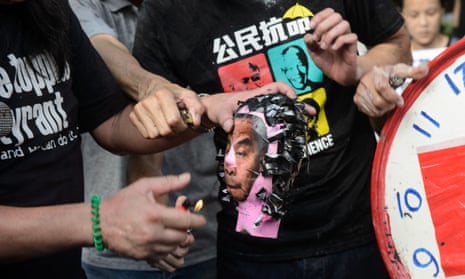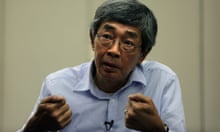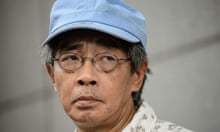Thousands of demonstrators have taken to the streets of Hong Kong to demand the resignation of its unpopular leader and answers over China’s alleged abduction of five local booksellers.
The march comes a fortnight after a simmering row over China’s detention of the five boiled over again when, after being released, one of the men publicly accused Beijing of sending special forces to take him into secret custody.
Lam Wing-kee, a 61-year-old bookshop manager who spent eight months in detention, had been expected to lead Friday’s march, which is held each year to mark the date of Hong Kong’s return to Chinese rule in 1997. However, just hours before the protest was scheduled to start organisers announced he had pulled out after receiving an unspecified “severe threat”.
“I believe that serious threat is from the central [government],” Jimmy Shum, a leader of Hong Kong’s Civil Human Rights Front, which organises the march, told the South China Morning Post. “We believe that the central government really minded Mr Lam heading this rally.”
In a statement the group said: “We urge all parties to stop the suppression against Mr Lam.”
After Lam’s damning and unexpected testimony, pro-democracy leaders accused Beijing of acting like a gangster state in order to silence critics.
Lam told the Guardian his interrogators had seemed particularly determined to discover the identity of the source for a recent book about the Chinese president, Xi Jinping. “It was very scary. Even now I get scared when I think about it,” he said.
Alan Leong, a prominent pro-democracy leader who joined the march, said the protest signalled the former British colony’s anger at Beijing’s erosion of its freedoms.
He said demonstrators were calling for the resignation of Hong Kong’s chief executive, CY Leung, who critics accuse of failing to properly confront China over the bookseller scandal.
“The Chinese Communist party … seems to be thinking that by exerting pressure and by increasing the pressure on Hong Kong people, Hong Kong people will then resile to the fact that David is no longer a match for Goliath and [will] give up,” said Leong, a Civic party politician.
“One message that the march wants to convey is that we are not giving up – we are not giving in to the pressure.”
In Lam’s absence, the march was spearheaded by two other Hong Kong residents who have suffered at the hands of China’s security services: Ching Cheong, a Christian journalist who spent more than 1,000 days in prison in China after being detained on espionage charges; and Lau Shanching, a pro-democracy campaigner who was jailed for a decade in the 1980s after helping activists in the southern province of Guangdong.
On the eve of Friday’s rally, Beijing expressed displeasure at plans for Lam, Ching and Lau to head the annual protest.
Their presence showed Hong Kong’s opposition was “now openly challenging the mainland’s political and legal establishments”, the party-controlled China Daily newspaper argued in an editorial, adding: “This would be a dangerous development.”
Leong said the suspected abduction of the five booksellers – one of whom, Gui Minhai, remains in custody in an unknown location – had made Hong Kong citizens anxious. “If we cannot be entitled to be free from fear … that is very, very worrying.”
Referring to the post-handover formula which guarantees Hong Kong legal autonomy and far greater political freedom than the authoritarian mainland, Leong said: “This strikes to the core of the ‘one country, two systems’ set-up … How can one of us, a Hong Kong permanent resident, be evaporated … for something that he did within Hong Kong which was perfectly lawful according to Hong Kong laws?”
Activists accuse Xi of instigating a severe crackdown on political opponents and civil rights since he took power in 2012.
One of the most notorious examples of this has been the disappearance of the booksellers. The men, who had specialised in tabloid-style books about the private lives of China’s leaders, vanished from Thailand, Hong Kong and southern China last year only to reappear in the custody of Chinese police. Beijing has accused them of involvement in “illegal activities”.
On Friday morning, Xi gave a televised speech in which he called for moves to “comprehensively purify the political ecosystem” in China.
Speaking at the Great Hall of the People to commemorate the 95th anniversary of the Communist party’s foundation, Xi claimed Hong Kong’s “one country, two systems” model – which some activists now claim is in tatters – had proved successful and Beijing’s commitment to it was “unshakeable”.








